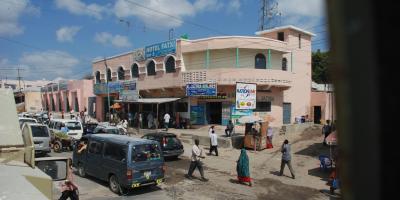
The spectre of extremist violence looms large over Somalia and its capital Mogadishu. Separate attacks have caused more than 1,000 casualties in the last six months alone, and the population lives under a constant threat of violence.
One of the world’s most fragile states, Somalia has consistently ranked among the global top ten countries most affected by terrorism, according to the Global Terrorism Index.
Tackling serious crimes in Somalia
Serious crimes – including extremist violence but also maritime piracy, cybercrimes, money laundering and counterfeiting, human trafficking, extortion, and smuggling of weapons and food – have been able to proliferate amid a climate of impunity in Somalia. The absence of a strong and competent justice sector has hampered the country’s ability to prosecute such crimes in line with Somalia’s Provisional Constitution and international law.
|
Right to a fair trial The right to a fair trial is a human right. It is one of the universally applicable guarantees recognized in the Universal Declaration of Human Rights and enshrined the International Covenant on Civil and Political Rights, a legally binding treaty. The right to a fair trial entails minimum procedural safeguards to ensure the proper administration of justice and protect against infringements upon human rights and fundamental freedoms. These include:
Further information: UN Counter-Terrorism Implementation Task Force, Basic Human Rights Reference Guide: Right to a Fair Trial and Due Process in the Context of Countering Terrorism, available here |
The Federal Government of Somalia that took over from the transitional government in 2012 has been working with the international community to advance the country on a path toward stability and reconstruction. IDLO is assisting the country to strengthen its justice institutions, improve governance and improve access to justice.
Key priorities of the government include reducing the threat posed by Al Shabaab militants and other terrorist groups, preventing and countering violent extremism, and building strong institutions capable of delivering justice to Somalia’s citizens.
Mock terrorism trial for justice professionals
Until recently, terrorism trials were mostly conducted in military courts under military laws that did not afford adequate rights to the accused and came under heavy criticism from human rights advocates. The bulk of the serious crimes caseload is now being moved to the civilian criminal court system, adding a heavy burden to Somalia’s underdeveloped justice system.
In a series of programs supported by the US Department of State, IDLO has been building the capacity of criminal justice professionals to conduct serious crimes trials in respect of international standards for rule of law, human rights and due process.
Now, in early March 2018, IDLO joined forces with the United Nations Office on Drugs and Crime (UNODC) to co-organize a mock trial simulating a case of extremist violence, which allowed Somali justice actors to put into practice their training.
Using fictitious but realistic scenarios of two incidents – a hotel explosion and a shooting at a Mogadishu coffee shop – a group of judges, prosecutors, defense lawyers and investigators was given a chance to test their skills. The activity required them to present charges, handle case exhibits, present opening statements, mount a defense, cross-examine witnesses, and hand down the ruling. Arguments and procedures had to comply with fair trial standards, human rights and constitutional law.
Detailed trial scenarios were prepared by UNODC to outline the series of events and prepare the participants for their roles. International criminal justice experts supervised the activity and acted as mentors to the participants. To simulate real-life court conditions, Kenya’s Supreme Court in Nairobi was selected to host the activity in one of its courtrooms.
Investing in justice sector development
IDLO’s Country Director in Somalia praised the involvement of the Somali Chief Justice, Minister of Justice and Attorney General, commenting that their “high-level participation shows the unwavering commitment of Somalia’s justice leadership to enhance the human capacity of the sector”. Somalia’s Chief Justice, Ibrahim I. Saleebaan, noted “the need to incorporate this type of training in the curriculum for junior judges”.
UNODC’s Head of Criminal Justice and Anti-Corruption, Charity Kagwi-Ndungu, said: “UNODC is grateful for the collaboration with IDLO on the successful implementation of the mock trial and remains committed to the support of the Somali justice sector in collaboration with IDLO.”
“This is an unprecedented undertaking and we are elated to partner with UNODC. We look forward to working with our UN colleagues to invest in the development of the justice sector,” added IDLO's Country Director.
Back in Mogadishu, UNODC is due to inaugurate a new complex housing a high-security prison alongside court facilities for serious crimes trials. The structure will help ensure the safety of all judicial personnel involved in proceedings and minimize the danger of transporting high-risk detainees to court.
IDLO is also working with Somali justice institutions to update the Penal Code and Criminal Procedure Code. Other IDLO programs include supporting the return, reintegration and protection of internally displaced persons and refugees, modernizing the alternative dispute resolution system, and building an effective Financial Reporting Center.
Top photo credit: Flickr / Enough Project, Scene on a Mogadishu Street

